
Read this page in English: Silke Noll – Training and Consulting
Silke Noll kommt ursprünglich aus Deutschland und lebt in Neuseeland. Sie ist zertifizierte Seminarleiterin, Trainerin und Consultant für interkulturelle Kompetenz, Kommunikation und Teambuilding, sowie zertifizierter Personal Coach (NLP-Master). Außerdem ist sie Autorin zweier Bücher über interkulturelle Kommunikation in Neuseeland, Wahlheimat Neuseeland und Leben und Arbeiten in Neuseeland. Als Accredited Kanban Trainer der Kanban University, Kanban Coaching, Product und Management Professional, Enterprise Agile Coach, zertifizierter Scrum Master (PSM) und Product Owner betreut Silke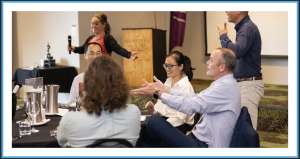 Change-Prozesse auf Management-, Team- und persönlicher Ebene in verschiedenen Unternehmen. Sie ist die Gründerin der Kanban New Zealand Meetup Gruppe und des dazugehörigen Youtube Channels mit Recordings der meisten Events.
Change-Prozesse auf Management-, Team- und persönlicher Ebene in verschiedenen Unternehmen. Sie ist die Gründerin der Kanban New Zealand Meetup Gruppe und des dazugehörigen Youtube Channels mit Recordings der meisten Events.
Dank ihres erweiterten Verständnisses von Kultur trainiert und coacht sie nicht nur KMUs und Großunternehmen, sondern auch Regierungsorganisationen in Ozeanien und Europa.
Silke ist seit 2012 als Agile und Kanban Trainerin und Consultant tätig. Insgesamt verfügt sie über mehr als 25 Jahre Berufserfahrung in vielen IT- und finanzwirtschaftlichen Projekten, sowie als Salesperson im Investment und Retail Banking, als Management Consultant, Business Analyst und Test Consultant.
Weiter unten findet ihr Infos zu Kanban sowie interkulturellen Trainings. Hier könnt ihr 45 Minuten Mentoring / Beratung buchen, um zu erfahren, wie Silke euch bei Kanban / Agile / ways of working oder bei interkulturellen Themen helfen kann. Wenn ihr nach Neuseeland einwandern wollt und Informationen zur Kultur und dem Arbeitsmarkt haben möchtet (keine Visaberatung!!), dann bucht bitte den untigen 30-minütigen Zoom-Call. Unter Silke's Unterkunfts- und Reiseseite findet ihr jede Menge Tipps zu eurer Neuseelandreise, insbesondere zu Wellington und der Nordinsel. Tipps, die ihr nicht unbedingt im Reiseführer findet, und die auch nicht die typische touristische Route darstellen, die fast jeder Tourist fährt, der nach Neuseeland kommt. Unter anderem auch nette Cafés und Restaurants, Neuseeland-Podcasts, Reiseliteratur und die neuesten Reiseführer, Kunstführer und Craft-Beer-Track, Boutique-Weingüter, Wandern und Biken, Tipps zu Zahlungsmöglichkeiten, die neuesten und besten Dokus über Neuseeland im deutschsprachigen Fernsehen, und vieles mehr. Wenn diese Tipps nicht reichen und ihr nicht wißt, wo ihr anfangen sollt, könnt ihr bei mir einen individuellen 30-minütigen Zoom-Call für €49,90 buchen. Danach könnt ihr euch fokussierter an die eigene, auf eure Bedürfnisse zugeschnittene Recherche machen.
Wie kann Silke im Projektmanagement / ways of working / Kanban / Agile helfen?
- Management von unternehmensinternen und -externen Abhängigkeiten, das funktioniert!
- Funktionierendes Backlogmanagement – das fehlende Stück zu jedem Produktansatz und -training.
- Effizientes Portfolio- und Multiprojekt- / Multiproduktmanagement mit mehreren Teams.
- Von der Strategie zum Backlog zur Umsetzung und Lieferung.
- Lieferung des gewünschten Outputs / Outcomes zur richtigen Zeit und in der gewünschten Qualität.
- Lieferung von Produkten und Services, die für den Kunden für seine Bedarfe und Zwecke geeignet sind.
- Linderung von Überlastung, sowohl auf der individuellen als auch organisatorischen Ebene.
- Nutzung von Metriken und Daten, die tatsächlich die gewünschte Verbesserung erreichen.
- Durch die interkulturelle Trainerlinse ein tiefes Verständnis von (Unternehmens-)kultur und der Menschen darin. Kreation von unternehmerischen, kooperativen Teamkulturen.
- Outcome-orientierte Moderation.
- Greifbare Verbesserungen in Wochen, nicht Monaten oder Jahren.
- Okaloa Flowlab (siehe weiter unten)
Aktuelle Kanban Trainings (alle Trainings sind auch als Inhouse Trainings möglich)
- 14-25/06/25 in der Berliner Zeitzone auf Englisch: Team Kanban Practitioner online (unter der Woche nachmittags).
- Spezialpreis in 2025: 30/06-01/07/25 in der Berliner Zeitzone auf Englisch: Flow Manager online (ganze Tage unter der Woche)
- 04-05/08/25: Team Kanban Practitioner (nach der Arbeit unter der Woche)
- 09/10/25 Team Kanban Practitioner (ganztags unter der Woche)
- 16/10/25 Scrum Better with Kanban (ganztags unter der Woche)
- 10-13/10/25 Kanban System Design online (Fr evening, Sat, Sun afternoon, Mon evening)
- Spezialpreis in 22-23/10/25: Flow Manager online (ganze Tage unter der Woche)
- 07-10/11/25 Kanban Systems Improvement online (Fr abends, Sa, So nachmittags, Mon abends)
- 07-13/11/25 Kanban for Design and Innovation (Fr abends, Sa nachmittags, ganztags Donnerstag)
- 13/11/25 Kanban for Design and Innovation Extension (ganztags Donnerstag)
Die besten und neuesten Kanbanbücher auf deutsch (zu den englischen geht's auf der englischen Seite): Kanban - kurz und gut - Silke war eine der Reviewerinnen. Das Buch beschreibt viele Kanbantechniken wie wir sie in unseren Trainings leeren. Kanban - der evolutionäre Weg zu agilen Organisationen vom Gründer der Kanbanmethode und ins Deutsche übersetzt, beschreibt er auf sehr persönliche Weise die Entstehung und Entwicklung der Kanbanmethode und warum sie heute ist wie sie ist.
Spezialgebiete bei interkulturellen Trainings:
- Interkulturelle Trainings und Coachings, sowohl kulturübergreifend als auch kulturspezifisch
- Team Building, insbesondere im internationalen Umfeld
- Einzelcoachings, auch über einen längeren Zeitraum hinweg, meist von Neuankömmlingen in Ozeanien
- Ozeanien (Australien, Neuseeland, Pazifikinseln)
- Deutschland, Italien, Frankreich, Spanien, Großbritannien
- Moderation und ergebnisorientierte Begleitung von Kulturwandel
- in Teams (Agile Transformation, Unternehmenszusammenschlüsse, etc.).
- auf Management- und Vorstandsebene.
- im Licht von Unternehmenszielen (finanziell und strategisch), inklusive Buy-in über alle Unternehmensebenen hinweg.
Aktuelle interkulturelle Trainings (alle Trainings sind auch als Inhouse Trainings möglich)
- Interkulturelles Training Neuseeland, online auf Englisch, 6x2Stunden.
- Auf Anfrage: Interkulturelles Training Neuseeland, online in deutscher Sprache, 6×2.
- Intercultural awareness training – your start into intercultural agility.
- 03/06/24 in Berlin: Intercultural awareness training – your start into intercultural agility.
- 01/11/24 in Sydney: Intercultural awareness training – your start into intercultural agility.
- maßgeschneiderte interkulturelle Trainings (siehe oben für Spezialisierungen)
Zu diesem Buch hat Silke aus neuseeländischer Sicht beigetragen (Januar 2025): Global Cultural Interplay: Elevating the Art of Buiness Success Across Cultures
Okaloa Flowlab
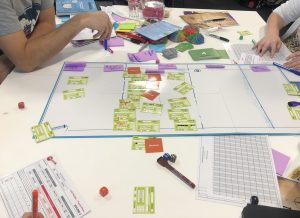
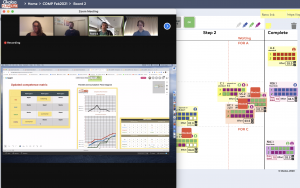
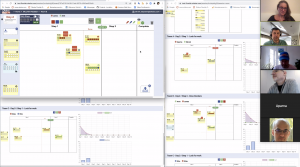
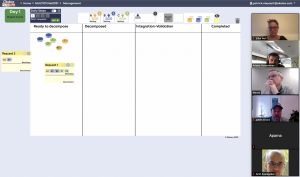
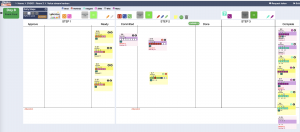
- Okaloa Flowlab Teamflow simulation (in-person and virtual version):
Through simulating a conventional work environment that reflects a mechanistic mindset characterized by a focus on resource efficiency, command and control and specialist workers, participants experience which roadblocks need to be overcome. As the team is taking its first baby steps into agile, they will experiment (in 2 or 3 rounds) with policies and practices (e.g. pull of work, cadences, limiting WIP) that enable collaboration, get the team into flow, and allow an agile mindset to emerge. Weaved into the simulations they will discover the fundamental difference between resource efficiency and flow efficiency.
- Okaloa Flowlab Workflow simulation (in-person and virtual version):
In most organizations work is handed over from one specialist role to another, following a certain sequence, also known as a workflow. Workflow cannot be ignored as it is an important part of how work is organized in most organizations, even including agile organizations. Participants will experience workflow (loopbacks) and dependencies. With this simulation we are simulating a typical workflow as defined in e.g. Jira or any other tracking system, whereby work goes from one person to another, and back in case of loopbacks. The Workflow simulation shows what Kanban really is about – differentiating between proto-kanban and Kanban as well as teaching how to deal with back-flow.
- Okaloa Flowlab Competence simulation (in-person version):
What happens when you have specialist workers involved when delivering value to the customer? When you rely on specialist workers, you automatically create dependencies, i.e. key man dependencies, and dependencies between work items. The purpose of this simulation is to experience bottlenecks as a result of assigning work to the specialist. This simulation is relevant when you want to introduce the concept of staff liquidity. It can be used in environments where methods like e.g. Kanban and Scrum are applied.
- Okaloa Flowlab Multi-team simulation (in-person version):
This simulation allows an experience of flow and collaboration across multiple teams that need to work together to deliver value. Individual teams can be competence, component or technology teams each with their own area of specialization. They could even be feature teams (full-stack teams) to the extent that each feature team focusses on its own feature set (e.g. check-out, …). The simulation demonstrates multi-tiered flow and collaboration across 2 different levels: 1) the request level and 2) work item level. One of the elements of this simulation is to experience bottlenecks in a multi-team context and the effects of this on delivering value. This simulation is relevant in combination with methods that address scaling.
